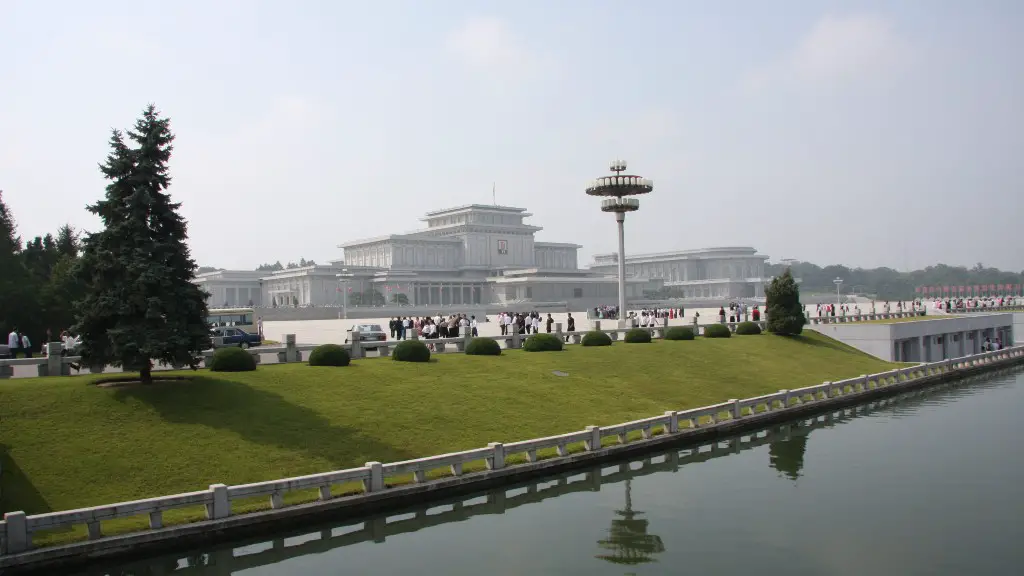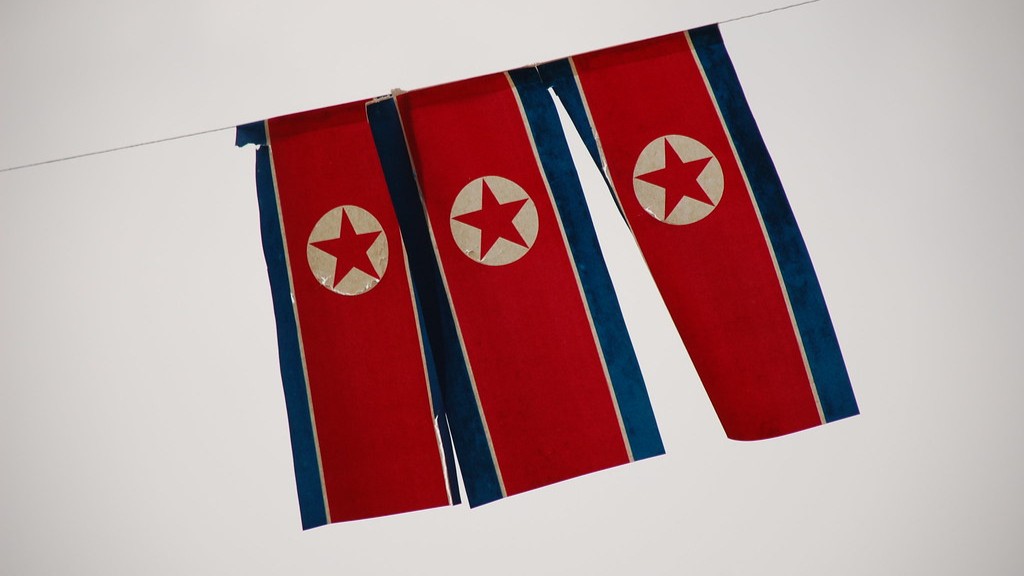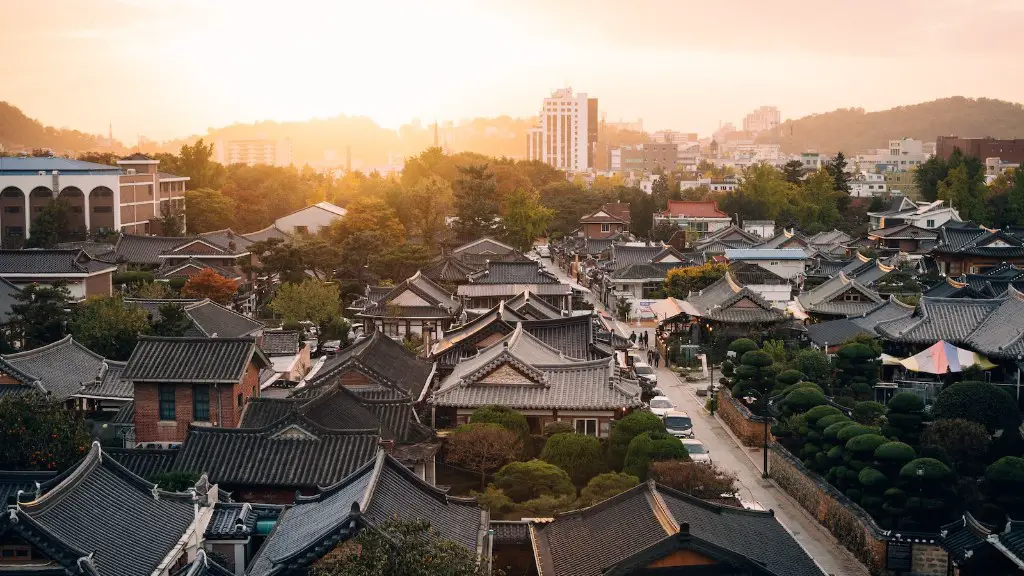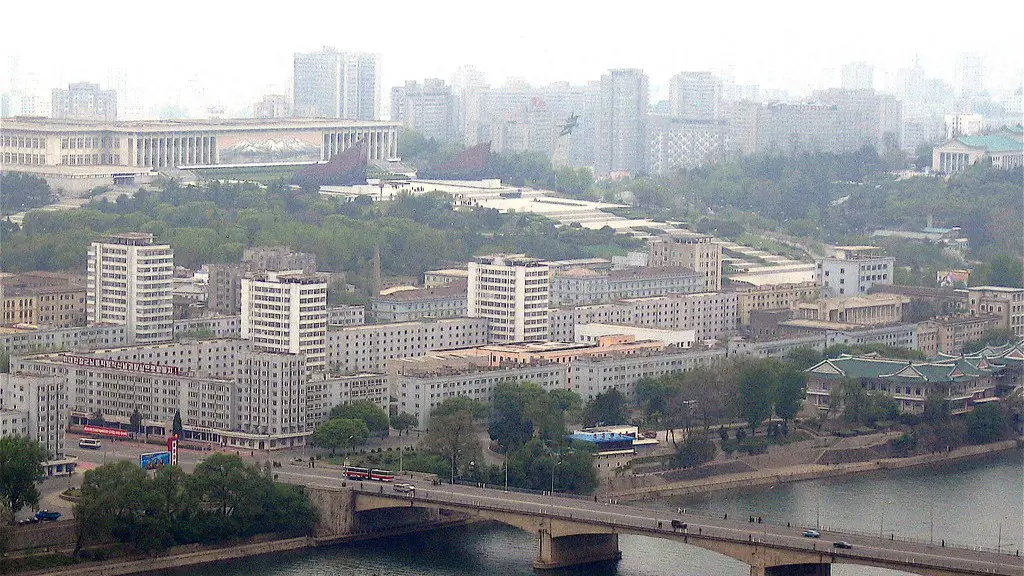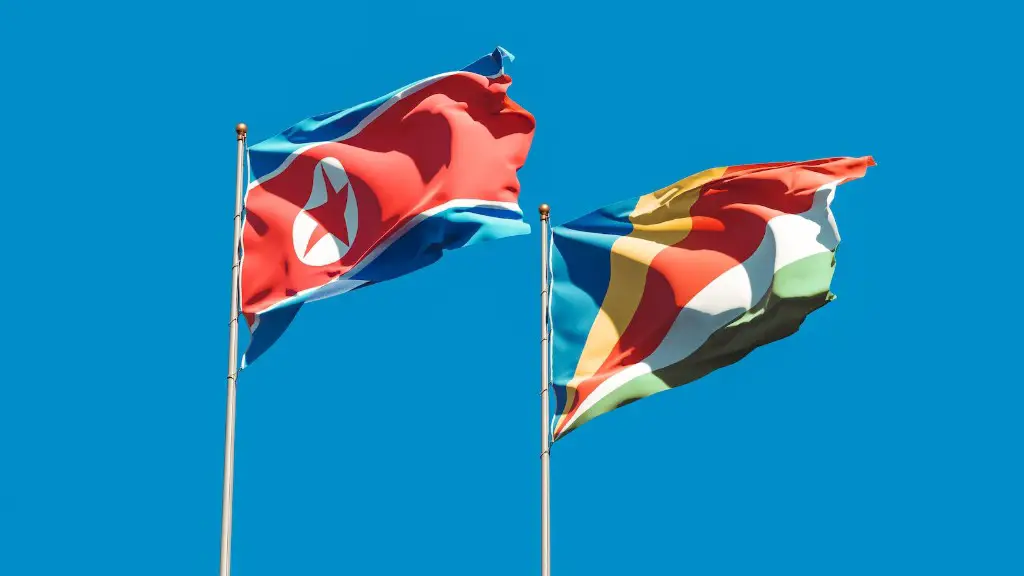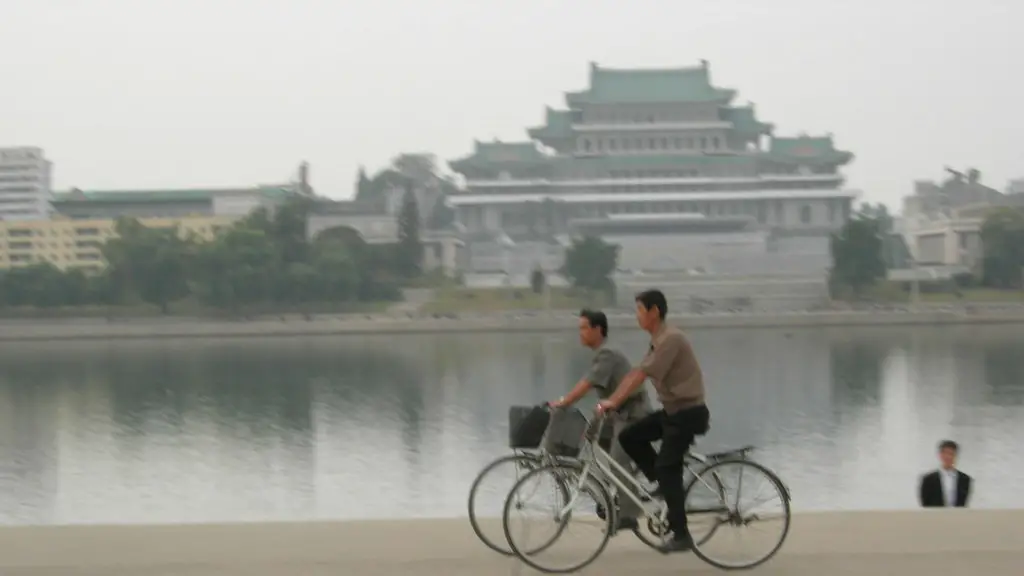Exploring How North Korea Survived the Collapse of the Soviet Union
Since its inception in 1948, North Korea has been notoriously known as one of the most secretive and oppressive regimes in the world. It is a hereditary communist state led by the Kim dynasty with enormous power and influence over its citizens. This rigid dictatorship has been able to withstand the Korean War, dictatorships, and several internal revolts, and as of lately is still lingering in the spotlight due to its controversial nuclear weapons program. The question of why North Korea is still around has intrigued many academics, politicians and historians.
Throughout its history, North Korea was able to establish economic ties with the former Soviet Union, which allowed it to capitalize on the conveniences and allies of a socialist system. As a result, the country was able to become an industrialized society within an amazingly short amount of time. Thanks to this set up and Eastern Bloc support, North Korea was able to survive the horrors of the Korean War (which lasted three years) and establish itself as a power to be reckoned with in East Asia.
However, the fall of the Soviet Union in 1991 created a power vacuum in the region and posed a real threat to North Korea’s staunch independence and hard line communism. The abrupt collapse of the Soviet Union created an economic crisis in North Korea, since its economy was heavily based on trade and aid from the former Eastern Bloc countries. At that time, North Korea was left alone to confront this devastating situation, as China and South Korea had implemented economic reforms and opened themselves up to the world.
The international community was also highly critical of North Korea’s second generation dictator, Kim Jong-il. He implemented a military-first policy known as the “songun,” where the military became the focus of the country’s investment, resources, and attention. This strategy allowed the country to remain militarized, even in the face of severe economic hardship, and the regime was able to stay in power mainly due to its might.
Nevertheless, North Korea was still heavily dependent on foreign aid and investment to sustain its economy. Fortunately, North Korea was able to enter talks with South Korea and the international community, which resulted in aid and normalization of relations. The negotiations resulted in the partial relaxing of sanctions as well as increased collaboration between the two Koreas. Moreover, South Korea provided food and energy aid to its northern neighbor, effectively restoring much of its economy.
This does not mean, however, that North Korea is now a prosperous nation. International sanctions have been crippling the economy again as of late, especially due to the country’s continued nuclear ambitions and human rights abuses. Nevertheless, it is still a formidable presence in East Asia and its population is indoctrinated in its beliefs and principles.
Understanding the Flawed Economic System in North Korea
The economic system in North Korea is a strange one. It is a combination of Juche, a form of isolationist communism, and a centrally planned economy. This system has caused North Korea to suffer an economic crisis since the fall of the Soviet Union. This crisis result in a period of famine and mass starvation that affected millions of North Koreans. Although aid programs had alleviated some of the effects of this crisis, the population still struggles with poverty and minimal economic freedom.
The lack of external trade has led to the creation of an underground market for goods and services. This ‘second economy’ has created a parallel economy that is estimated to be worth hundreds of millions of dollars. It has helped to keep North Korea from economic collapse by providing certain goods, such as food and luxury items, that would otherwise be unavailable. Unfortunately, this second economy is often managed by local warlords, who demand hefty fees for their services.
Recent developments in North Korea have been less than encouraging. In 2017, the country tested its largest nuclear device and has threatened to use the weapon if its demands are not met. This has caused great alarm in the international community and has led to the implementation of even stricter economic sanctions. In spite of this, North Korea continues to remain an isolated and oppressive regime.
The only way North Korea can move forward is through economic reform. Unfortunately, this is something a deeply entrenched regime like North Korea is unlikely to do. In spite of this, the hope that it will eventually develop a more open and tolerant society still exists.
The Nature of North Korea’s Ideological Quadrant
The ideology that governs North Korea is known as “Juche” and is derived from the Marxist-Leninist ideology. The emphasis of the Juche ideology is on self-sufficiency and self-reliance; this is why North Korea has remained so isolated from the international community. The fact that it is completely isolated from international influence, and has been for the past several decades, plays a major role in why it remains so steadfast in its ideology.
The government in North Korea claims that its citizens are the masters of their own destiny, and all decisions are based on the collective interests of the country. This creates a hierarchical system of control where the people at the top make all the decisions, while those at the lower end are given limited freedom and access to resources. The country is highly militarized and its citizens indoctrinated in its ways. This ideological rigidity and lack of transparency have resulted in North Korea becoming one of the most oppressive regimes in the world.
This extremely totalitarian mindset has resulted in a lack of dissent and unified support for the regime, even in the face of oppressive policies. This power and authority have allowed the government to maintain complete control over its citizens and its steady grip over the nation’s resources. It is this kind of strict control that has allowed North Korea to remain in power, despite trying economic and political times.
Exploring the Role of International Negotiations in North Korea
One of the major factors that has allowed North Korea to remain a power in the region is its strategic involvement in diplomatic talk. The country has been involved in talks with the United States, South Korea, Japan, and other countries since the 1990s. North Korea has used these talks to present itself as a viable entity in the eyes of the international community, and has used its strength and bravado to hold the attention of those involved.
The talks have also resulted in North Korea receiving aid and investments from other countries, as well as being granted some level of recognition. This has helped the nation to further its own goals and boost its standing among other nations. North Korea has also used threats of military action to further its own objectives, such as when it threatened to attack the US in 2002. But despite the bellicose rhetoric, the talks have been generally effective and remain an important factor in why North Korea is still around.
At the same time, that does not mean that these negotiations have been without difficulties. North Korea is one of the most opaque governments in the world and talks tend to break down due to the lack of trust and the sudden changes in protocol. In addition, the nation is often quite aggressive towards other countries and international organizations, making negotiations especially difficult.
North Korea has been able to use the talks to extract concessions from other countries, but these advantages have been paid for with a heavy price. It has become clear that North Korea is far from implementing economic or political reforms, as its aggressive stance continues to result in considerable hostility from other countries.
Analyzing the Citizen’s Perception of North Korea
North Korea has an overwhelming propaganda machine that ensures that its citizens are indoctrinated into their beliefs and principles. The government is keen to present itself as the only true representation of the country, and citizens are not allowed to criticize its policies or the country’s leadership. The media is heavily censored, and any signs of disobedience or disaffection are severely punished. The government has also taken measures to control its population through mass surveillance and the practice of imprisonment in secret camps.
Citizens of North Korea are raised in an environment of fear and manipulation, where they are taught to believe the lies that their government feeds them. This creates a cycle of obedience and loyalty where citizens are unable to think critically and are just blindly accepting of the government’s actions. As a result, people in North Korea are likely to be highly supportive of the regime, even if it results in the suffering of their own people.
As much as North Korea has taken measures to control its population, it has not been completely successful. Many North Koreans living abroad have managed to create a thriving culture that celebrates and expresses the country’s unique identity. These people have managed to retain a sense of freedom and have been able to educate and speak out against the oppressive regime.
Activists in North Korea have also managed to organize protests and other forms of dissent against their government, despite the high risk associated with their actions. This shows that, despite the rigid controls of the government, there is a desire amongst North Koreans to make their voices heard and to fight for their rights.
On the Verge of a Democratic Future?
The situation in North Korea has changed drastically in the past few years. After Kim Jong-Un came to power in 2011, there has been a noticeable shift towards unofficial reform. The government has taken some steps to liberalize the economy, as well as making efforts to improve relations with South Korea and the international community. This has resulted in a slight improvement in living conditions and some degree of economic freedom.
So far, these changes have been limited and it remains to be seen if the country will be able to make any further progress. In spite of this, it is clear that North Korea is no longer completely isolated and that cautiously optimistic reform could be on the horizon. This does not mean that the country will suddenly become a democracy overnight, but it does show that the country is taking steps in the right direction.
Only time will tell what the future holds for North Korea, but change could be just around the corner. While the country is still facing economic hardship, it is clear that its citizens are eager for reform and could make a great leap forward in the near future.
Examining North Korea’s Interactions with Other Nations
North Korea has had a long and strained history of relations with other countries. While it has managed to create and sustain a system of isolationism, its relationships with the international community have been far from stable. This has been further complicated by North Korea’s nuclear ambitions and threats of military action, which has led to a tense political atmosphere.
The United States has long been a major source of conflict for North Korea. In recent years, diplomatic talks have managed to defuse the animosity between the two countries, but this does not mean that the rift has been healed. The relationship still remains fraught with tension, and any wrong move could easily plunge the two countries back into war.
North Korea has also had rocky relations with countries such as China, Japan, and South Korea. This is mainly due to territorial disputes, economic sanctions, and disagreements over nuclear weapons. North Korea has managed to find some common ground with its neighbors, as evidenced by the recent Summit between North and South Korean leaders, but
